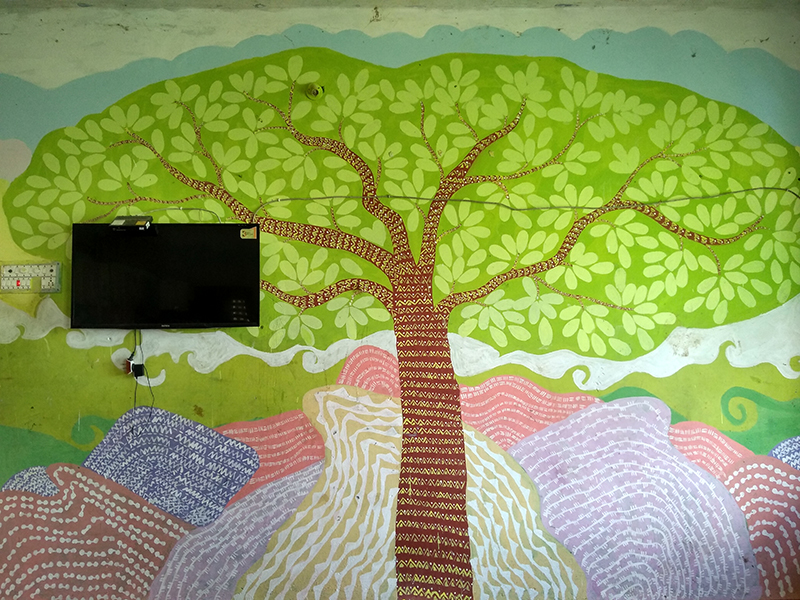Vanavil Trust
Grant Period: One year
R Revathi, a filmmaker and journalist, started the Vanavil Trust in 2004 when she was volunteering in the villages severely hit by the tsunami. Vanavil (Rainbow in English) School is an alternative residential school run by this Vanavil Trust in Keezhakaraiyiruppu village near Nagapattinam, Tamilnadu. It works closely with two of the most marginalised communities in this area - the Boom Boom Mattukarars and the Narikuravars, both nomadic tribes of Tamil Nadu. Children in these communities generally live on the streets and do not attend school. Given their nomadic existence, they are not part of the system and hence do not have access to their fundamental rights like the Right to Education.
The primary purpose of this project is to enable year-long activities to encourage students to bring their lived experiences, identity and the cultural practices of their communities into the classroom. The project seeks to create stronger ties between the students, the school and community members.
While working with the children in the aftermath of the 2004 tsunami, Revathi met a girl child at the Nagapattinam bus stand who was begging for money. To understand her family background and her situation, Revathi and a few other volunteers followed the child until they discovered 43 families belonging to the Boom Boom Mattukarars community in an isolated park. This incident touched her deeply and Revathi decided to get involved with these children. This gave way to the formation of the Vanavil Trust and the school in 2005.
The first batch of students consisted of 35 children. Since no member of the Boom Boom Mattukarars had gone to a school earlier, one of the main challenges was getting the children interested to come to school. Also since this community is largely nomadic, the attention span of the children was also low compared to other children. In addition these children could not be taught together with other children in the same class as they were prone to violence having lived a life of survival of the fittest. However Revathi, points out that with sheer dedication and the use of innovative teaching methods, she and her team were able to get around most of these problems. In 14 years, a lot has changed. In recent times, kids from these communities across the state have spontaneously come to Vanavil to find a safe place.
To get the children to come, the school came up with a range of creative options. One such exercise was buying them cycles and taking them to watch every new movie that was released. The school also observed that the children were excellent at counting money since they were used to begging, even when they had no clue about Mathematics. So, the school started teaching numeracy via the use of monetary transactions. As the students loved travelling, the school took them to various places and encouraged them to draw and sketch those places and eventually told them to write about them.
This grant addresses multiple needs of the children by enabling experimentations and explorations within Vanavil’s arts practice programme which includes bringing the lived experiences of the children and their community arts practices into their pedagogy. This project intends to bridge many worlds – that of learning opportunities within and outside the school; that of the culture in school and in homes; and of the connections at home and to the world outside. With this motivation this project has been planned in three parts.
The first part will lead to an arts integrated pedagogical activity book on four different themes. These themes and its objectives will be identified through debates and discussions by involving academicians, teachers, community members and students at regular intervals. The evaluation of the effectiveness in reaching the set objectives will be done on a regular interaction with the subject experts. This entire process will be monitored by the Head Master and Revathi.
The second part of the project will strengthen and document the arts and performance practices of the institution and shape a cultural team of the children from ages ten to fifteen years through artistic processes. This will be followed by a series of exhibitions and performances.
The third part of this year long engagement will facilitate students to enrich their folk sensibilities and form team in the school. The school will engage students in various skill development workshops to learn Parai – a form of folk dance of the community. The process will include documentation of the cultural practices of the Boom Boom Maatukarar community through interviews. Further, this would create an open archival resource to encourage interested researchers.
The outcomes of the project include an art integrated pedagogical activity book, audio recordings of the community songs of the Boom Boom Maatukarar people, an exhibition and performances.
This grant is part-supported by Infosys Foundation.




